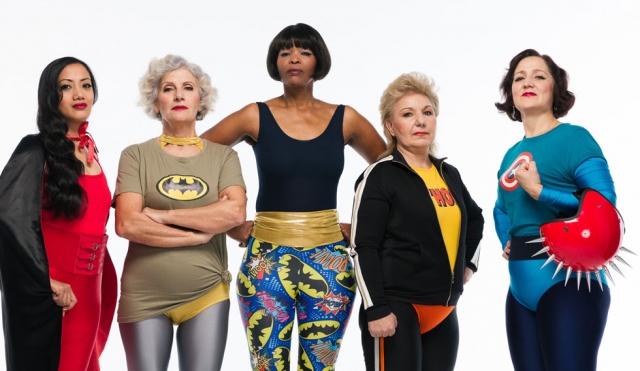photos www.ethnos.gr
Immigrant cleaning ladies in Athens are the main characters in a play to be performed from 3 to 14 February at the Onassis Foundation's Cultural Centre.
"Clean City" by Anestis Azas and Prodromos Tsinikoris, the new artistic directors of the experimental stage of the National Theatre, traces and redefines stereotypes through the gaze and personal accounts of the real experts when it comes to cleanliness: the immigrant cleaning ladies of Athens. The play examines racism, the peril of fascism, female immigration in Greece and the personality of the "cleaning lady".
Who cleans Athens? Why are the majority of Athens’ cleaners women and immigrants? Were they ‘born’ cleaners? How do their CVs differ from yours? Perhaps in the end we are all objects of history? These are just some of the questions that the play raises.

The five "super-heroines" of Clean City
A few days before the premiere, Ethnos met with the five main characters.
Their lives draw a new image of the cleaning lady. One of them was a university lecturer, another an architect, but these women had to sacrifice themselves for their families, and were fighting against a supernatural power, as modern-day super-heroines.
"The theatre of the real" is a method of writing and directing that scopes its stories from personal accounts or historical documents; it invites our contemporaries to leap into the centre of the dramatic narrative.
Rositsa Pandelieva, 55, hails from Bulgaria, preschool teacher
We are cleaners, but above all we are people
"I came to Greece 13 years ago – illegally, through a Bulgarian agency. At first I was pretty scared, I was on my own, no one was waiting for me, I did not know a word of Greek! It was a Calvary. Since I had a diploma as a preschool teacher, my first job, which lasted nine months, was for a family that had five children. I felt like I was in jail, they didn't allow me to cry in front of the children, I had to smile all the time and do all sorts of work, every day, without any rights. I ran away one night while everyone slept, I even left my clothes behind.
I went through plenty of agencies, most of them exploited me financially, while at one point my husband decided to come to Greece with our son, and things got better. We found a place to live in, we got our act together and legalized our stay in the country.
We went through quite a few jobs, none of them paid enough, but I will never forget the magnanimity of a hotel owner in Faliro, who helped us a lot in the early years.
I've been a cleaning lady at the Cultural Centre of the Onassis Foundation for five years now, my son and my daughter are living in Bulgaria, and my husband works in Athens. We are immigrant cleaning ladies, but above all we are people. "
Drita Shehi, 63, from Albania, university lecturer
I remained jobless as soon as the regime collapsed
"I worked 17 years in Albania. I was a teacher at the Party University, my subject was history of Marxism-Leninism. When the regime collapsed, I remained unemployed with two children in elementary school.
A friend of mine told me that 30 teachers from Tirana were going to Greece on a scholarship and helped me get enrolled with the programme. It was January 1993, and I did a six-month university course on Greek culture and ancient philosophy, without my family. When the programme ended, I had to decide what to do. Eventually I decided to stay. A few years later, I parted with my husband and worked from dawn to dusk as a house cleaner to be able to raise my children. There is nothing to be ashamed of about this kind of work!
I worked for 15 years. I hold no grudges against Greek women at all. They loved me, they hugged me, they paid my insurance and helped me educate my children. I will never forget this.
Although I worked in Greece for 20 years, I wasn't eligible for retirement, no matter how ridiculous this might sound. In Albania, I get a €100 pension."
Mabel Mosana, aged 50, from South Africa, model, designer
In my country, I worked as a model
"I came to love Greece through my husband, Dimitris, who is Greek. He came to Johannesburg 23 years ago to find work. Back then, I worked as a model, I had a background as a fashion designer.
No sooner had we married in my country than Dimitris said he wanted us to go back to Greece. It was not an easy decision for me, but I followed him. I remember when I first came to Athens to be introduced to his family, the weather was pretty unwelcoming. It was snowing and it was really cold. This was the first time I saw snow. What struck me was that the houses were built one next to the other, without courtyards or trees.
Eventually I took the decision, we settled in Greece, we had our daughter, she is now 19, an educator and an excellent basketball player. My husband works as a chef, and I have been working as a house cleaner and a nanny all these years. Although I love the Greeks and have no regrets for having lived here, my dream is to go back to my home country. "
Fredalyn Resurreccion, 37, from the Philippines
I studied architecture and then came to Greece
"In the Philippines I studied architecture and then, in 2004, came to Greece. The fact that my two aunts were living and working here, helped me in taking this decision.